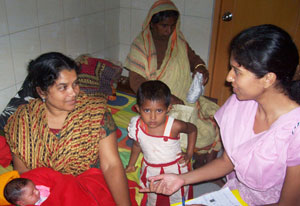Mobile health researchers seek to improve emergency obstetric care in Bangladesh
January / February 2013 | Volume 12, Issue 1

Photo courtesy of Shegufta Sikder
Researcher Shegufta Sikder collected data in
Bangladesh to implement a mobile phone-based
pregnancy and childbirth information system.
By Jeff Gray
In remote areas of Bangladesh, women's lives are often threatened during pregnancy and childbirth by complications such as hemorrhage, sepsis, eclampsia and obstructed labor. Researcher Shegufta Sikder, working with a team from Johns Hopkins University, is helping break new ground for a mobile health system that should reduce these risks and improve emergency obstetric care for Bangladeshi mothers.
The mobile phone-based platform, known as mCARE, is a pregnancy and neonatal health information system that connects rural health workers and facilities with pregnant women and their newborns. The system includes automated reminders for antenatal, postnatal and essential newborn care, notification of labor and birth, referral and decision-making support for rural women and families, and provision of emergency dispatch of health care.
In the country's rural northwest where the mCARE study was focused, few mothers deliver babies at hospitals. "Seventy-five percent of women give birth at home - in the absence of skilled medical personnel - and most women are at home when complications occur," said Sikder. "For the women who can reach health facilities to address their health problems, we were interested to understand whether these facilities can address these life-threatening conditions." She evaluated emergency obstetric care capabilities at 14 high-volume private and public health facilities while also identifying ideal patient referral locations for the mCARE system. The study, which was partially funded by Fogarty, determined there was potential to improve referral and that mobile health technology could play a key role.
The project is now in its pilot phase and Bangladesh's ministry of health has approved scale-up. The next step will be to measure resulting improvements through a study involving 800 pregnant women. The mCARE team will continue to work with Bangladesh's Ministry of Health and its in-country partners, mPower Health and JiVitA.
More Information
To view Adobe PDF files,
download current, free accessible plug-ins from Adobe's website.